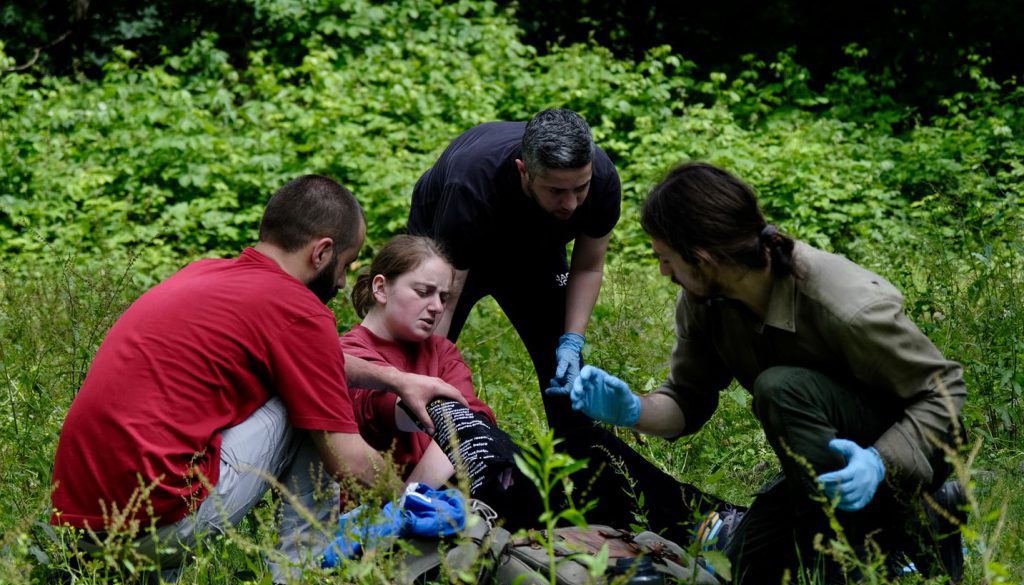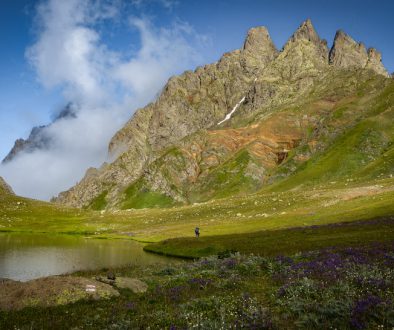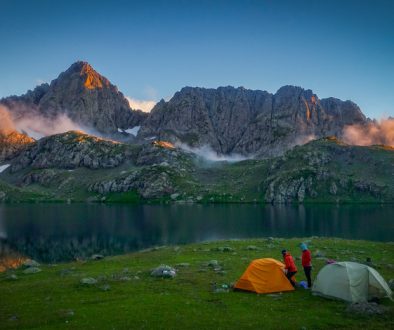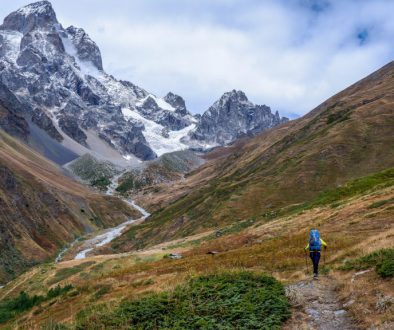Ready for the Unexpected: TCT’s Wilderness First Responders
The trailwork that we accomplished during the 2023 season would not have been possible without our dedicated trail crew leaders and volunteers. To ensure safe, productive, and fun field seasons, we train local crew leaders who are committed to expanding their training, learning new skills, and sharing their wealth of knowledge with others. New crew leaders participate in a comprehensive pre-season training program run by veterans of the Caucasus Conservation Corps (CCC) to prepare them for the responsibility of leading a crew of volunteer trail builders.
The 2023 crew leader training program kicked off in May with the region’s very first Wilderness First Responder (WFR) course for Georgian and Armenian crew leaders. Over the past few years, with the support of the U.S. Forest Service (USFS), we’ve been expanding and improving our CCC volunteer and crew leader training programs. As part of this support, the USFS sponsored a professional trainer to join us in Lagodekhi, Georgia, to lead a 10-day intensive wilderness medicine course.
We used this opportunity to bring together TCT and Trails For Change crew leaders from Armenia and Georgia, who worked together and learned from each others’ experiences.
Led by Dr. Todd Miner from the University of Colorado’s Department of Emergency Medicine, we learned about patient assessment techniques, practiced identifying medical ailments, and got hands-on experience splinting each others’ (fake) injuries, evacuating patients, and dressing wounds.
Along with some classic TCT camp activities—shared cooking and cleaning duties, frisbee during break times, and plenty of Georgian and Armenian songs and dances—we built a more united team that set the stage for a more productive and collaborative 2023 field season.

Why wilderness medicine training?
Strong trail crew leaders are the backbone of the TCT. They’re responsible for introducing volunteers to the wilderness work environment. They make sure that everyone stays safe and has fun. And they manage our trail building and maintenance projects on the ground.
Crew leaders need a wide blend of skills to be successful: technical skills to design and implement trail projects, communication and leadership skills to manage and support a team of volunteers, and problem-solving and decision-making abilities to lead a group in challenging environments.
We also work in some of the most remote, spectacular parts of the Caucasus. Because many of our trail work locations are over an hour’s hike from a trailhead—and several more hours up a bumpy road from medical assistance—we emphasize appropriate safety practices to help prevent accidents. But there’s always the risk of the unexpected.
When you’re camping hours from even basic medical assistance, the knowledge of how to manage accidents, medical conditions, and evacuations could save someone’s life. That’s why we consider it an essential skill for our crew leaders.
In the past, we’ve sent a few advanced crew leaders to Wilderness First Responder courses abroad to bring some of this knowledge back. For years, however, we’ve had the goal of hosting a full course in the region so we could train more people and contextualize the course to the Caucasus. We’re thrilled that the U.S. Forest Service helped us make this happen.

What does Wilderness First Responder cover?
Wilderness First Responder (WFR) is known as the gold-standard medical certification for outdoor educators, trail crew leaders, wilderness guides, professional search and rescue teams, wildland firefighters, and those involved in disaster relief. As far as professional certifications go, it’s a huge step up for our crew leaders.
The WFR course is designed to provide students with the knowledge and skills necessary to respond to medical emergencies in remote and wilderness environments where professional medical help may be delayed or unavailable. It emphasizes self-sufficiency, resourcefulness, good decision-making, and the ability to adapt to challenging and remote environments—all essential skills in our mountain work environments.
Throughout the week, we learned:
- How to assess and stabilize patients in wilderness settings. This includes performing a primary and secondary survey, evaluating vital signs, and managing common medical incidents like fractures, dislocations, and wounds.
- Cardiopulmonary resuscitation (CPR) and basic life support techniques for managing cardiac and respiratory emergencies. We learned how to recognize and respond to cardiac arrest, choking, and other life-threatening situations.
- Techniques for managing trauma-related injuries such as head injuries, spinal injuries, burns, and musculoskeletal injuries. We learned how to perform splinting, bandaging, and wound care in resource-limited environments (including improvising splints and litters with the materials around us).
- How to recognize and treat common environmental emergencies, such as hypothermia, heat stroke, dehydration, altitude sickness, and animal bites or stings.
- Critical thinking skills to make informed decisions in remote settings. We practiced strategies to prioritize care, determine when to evacuate a patient, and effectively communicate with emergency medical services.
- Proper patient care and evacuation strategies. We practiced constructing improvised stretchers, managing patient transportation, and coordinating with rescue teams in wilderness scenarios.
After each theory session, we applied our knowledge during hand-on practical scenarios that simulated real-life wilderness emergencies. We applied our knowledge and skills in simulated situations, allowing us to practice decision-making, teamwork, and effective communication.

How did it go?
The ample amount of hands-on practice gave everybody the opportunity to hone their skills. Dr. Miner’s teaching was supplemented by four simultaneous interpreters in Armenian and Georgian, who ensured that everyone could learn and participate regardless of their English level. We were joined for the last three days of scenarios by three Georgian physicians who volunteered their time to help participants practice scenarios and share their insights into the Georgian medical system.
At the end of the course, all participants successfully passed a written final exam and participated in a final multi-patient scenario to earn their certifications. We celebrated our 18 new Wilderness First Responders with a Georgian-style supra—complete with toasts, singing, and dancing. It’s pretty remarkable to witness these young people united by their shared love of the mountains and trail work, and to see them find ways to communicate and connect regardless of language barriers.
Huge thanks to the U.S. Forest Service International Programs for sponsoring this training, to Dr. Todd Miner for the excellent instruction, to the interpreters and physicians for their valuable input, and to all our crew leaders for their hard work and dedication to learning. Fortunately, the new responders’ skills were not called upon for any serious ailments or injuries this field season. They were prepared nonetheless, and volunteers could rest assured that they were in safe hands!







